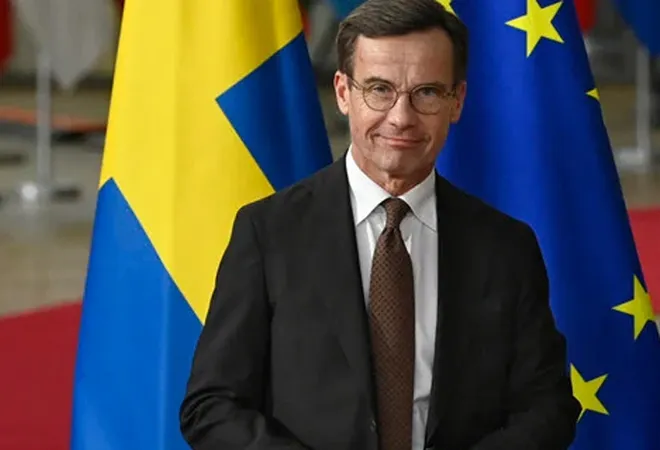-
CENTRES
Progammes & Centres
Location
Sweden’s 2023 presidency comes at a critical juncture as Europe confronts several challenges.

On 1 January 2023, Sweden will take over the Presidency of the Council of the European Union (EU). The Swedish presidency will be the last in the French, Czech Republic and Sweden trio that holds the presidency for the 18-month period from 2022 to mid-2023.
The six-month rotating presidency will provide Sweden with the opportunity to set and steer the EU’s agenda, find a compromise with the other 26 member states, advance the Council’s work on legislation, and liaise between the Council and other EU institutions.
Since joining the EU in 1995, Sweden has held the presidency twice—in 2001 and 2009. The 2009 presidency, which led to the implementation of the Lisbon Treaty, also took place at a pivotal period just after the 2008 Financial Crisis. Sweden’s 2023 presidency comes at a critical juncture in world politics, but also European politics. Besides soaring energy costs, inflation, and an economic downturn, the volatile international context resulting from Russia’s war in Ukraine is creating strategic transformations and transitions within the Union.
Besides the radically altered environment within Europe, even Sweden has undergone a political transition with a new centre-right coalition coming to power in October, ending the eight-year reign of the centre-left Social Democrats and with it Sweden’s feminist foreign policy. The elections led to a three-party minority coalition government, which depends on parliamentary support from the far-right anti-immigration Sweden Democrats.
Besides soaring energy costs, inflation, and an economic downturn, the volatile international context resulting from Russia’s war in Ukraine is creating strategic transformations and transitions within the Union.
Despite the new government’s reiteration that the EU is its “most important foreign policy vehicle”, there are concerns about the potential influence of the Euroskeptic Sweden Democrats in Brussels, particularly on migration policy and their cosiness with Hungary’s hardline leader Viktor Orban. In fact, post-Brexit, the Sweden Democrats also pushed for Swexit—a referendum on Sweden’s membership in the EU.
On 14 December, Swedish Prime Minister Ulf Kristersson officially presented Sweden’s priorities during its presidency of the Council, where the following key priority areas emerged:
Against the backdrop of Russia’s war against Ukraine, Sweden’s topmost priority is EU support for Ukraine, which will influence all aspects of the EU-decision making. Sweden will strive to secure EU unity, increase military and economic support, aid in post-war reconstruction, and continue pressure on Russia. Just recently, the EU agreed on the ninth package of sanctions against Russia, while Sweden passed a new military and humanitarian support package worth almost US$300 million for Ukraine. Sweden will also work towards speeding up the process of Ukraine’s EU membership.
NATO membership
Another tremendous change in Sweden is the abandonment of its centuries-long tradition of armed neutrality since 1814. While transforming the European security architecture, Russia’s war in Ukraine has also prompted Sweden and Finland to apply for NATO membership.
The EU agreed on the ninth package of sanctions against Russia, while Sweden passed a new military and humanitarian support package worth almost US$300 million for Ukraine.
This application to join NATO coincides with Sweden’s decision to increase its defence spending by up to 2 percent of GDP by 2026. There could be challenges, especially as the IMF predicts a 0.6-percent contraction in the Swedish economy in 2023. Yet, the war, which brought to reality the Swedish expression ‘ryssen kommer’ that translates to ‘the Russians are coming’, has led to a paradigm shift in Swedish foreign policy. Thus, even while Turkey and Hungary continue to block the process, completing Sweden’s NATO accession remains a top priority.
Despite the global trend of protectionism, Sweden continues to remain amongst the world’s most open and pro-free trade countries. This is unsurprising given how, according to the World Bank, 88 percent of the small export-dependent country's GDP is dependent on international trade. Swedish companies like IKEA, Ericsson, and H&M are global heavyweights. And despite Sweden’s political transition, there is unanimous support for free trade across the spectrum. Thus, strengthening Europe’s economic competitiveness is a top priority for the Swedish presidency, as the EU celebrates the 30-year anniversary of the single market in 2023 and also responds to the pressing geopolitical imperatives of diversifying supply chains and forging new trade partnerships.
In this context, Sweden attempts to speed up ratification on some of the EU’s pending trade deals including Free Trade Agreements with Australia, New Zealand, Chile and the Mercosur bloc—an economic and political bloc comprising Argentina, Brazil, Paraguay, and Uruguay. Providing fresh impetus to trade negotiations with India and Indonesia is also high on the agenda.
Transatlantic tensions
Another major priority area is Europe’s increasingly tense relationship with the United States (US), especially in the context of the new Inflation Reduction Act (IRA)—a significant climate legislation that offers US$370 billion in green subsidies and incentives to American companies and consumers to invest in and “buy American”.
Sweden has had amongst the highest rates of immigration and asylum seekers per capita within Europe, owing to its generous immigration policy.
The IRA, which Sweden’s new Trade Minister Johan Forssell described as “discriminatory” and “worrying”, has been perceived by Europeans as blatant American protectionism, that would adversely impact prospects for European industry. Thus, avoiding a trade war, deepening cooperation within the EU-US Trade and Technology Council, and improving ties with what Foreign Minister Tobias Billström termed “the most important trade relationship in the world” will remain high on Stockholm’s agenda.
Russia’s war has, literally on a war footing, accelerated Europe’s energy transition away from fossil fuels and Russian oil and gas towards renewables and greener sources.
Sweden’s ambitions to become climate neutral by 2045 are five years ahead of the European Commission’s Green Deal and Fit for 55 package through which Europe aims to become climate neutral by 2050 and reduce gas emissions by 55 percent by 2030.
Perhaps, no country is better equipped than Sweden—the country of climate activist Greta Thunberg and a world innovation hub and leader on climate initiatives—to spearhead not only Europe’s quest for energy security but also accelerate the green transition and tackle the climate crisis through the Commission’s RePowerEU package.
Migration
The issue of migration is amongst the most electric in Europe and indeed within Sweden itself. In recent years, Sweden has had amongst the highest rates of immigration and asylum seekers per capita within Europe, owing to its generous immigration policy. However, immigrants and their alleged lack of integration, have often been blamed for many of the ills, such as soaring crime rates, gang violence, increase in homicides, plaguing a relatively peaceful Swedish society. This has led to most Swedish parties, not just the Sweden Democrats, supporting a restrictive migration policy.
Swedish attitudes towards immigration have dramatically altered from 58 percent favouring migration in 2015 to 40 percent in 2022, resulting in Sweden accepting only 13,000 refugees in 2020 compared to its very generous 163,000 figure in 2015.
As migrants continue to make perilous journeys to Europe since the 2015 crisis, the inability to find consensus on this longstanding humanitarian issue has dented Europe’s soft power, exacerbated continental divisions, and provided openings to autocrats like Belarusian leader Lukashenka to capitalise on.
On migration, Southern European countries, where migrants first arrive, want mandatory relocations to other states; while Northern countries want to prevent these secondary movements.
Thus, progress on the EU’s Migration and Asylum Pact proposed in 2020 is crucial. Under current EU Home Affairs Commissioner Ylva Johansson—herself a Swede—whose efforts were instrumental in securing a European deal on Ukrainian refugees fleeing Russian aggression, Brussels would be well-positioned to progress on this.
Amongst other priorities will be a focus on accelerating innovation, for which Sweden is renowned worldwide through its leading tech companies like Skype, Spotify and Klarna. Yet, Europe invests less than the US and China in research and development, and its companies invest 40 percent less than American companies on new technologies.
On China, Billstrom emphasised that the EU will have “to find new ways of handling China” and “strengthen unity on China.” Progress on existing files carried over from the past presidencies of the trio on chips, Artificial Intelligence, digitalisation and data sharing will also be under focus.
Overall, the presidency will attempt to not be entirely dominated by crisis management, and uphold fundamental values and rule of law within the EU.
The critical challenge, as with most sensitive issues at the EU level, will be to forge and maintain unity. Cracks have already emerged on several fronts amongst the 27 member states.
On FTAs, different member states have diverse interests at stakes such as reservations on the Mercosur deal from agriculture-heavy states like France and Ireland. On the IRA, while the Nordic nations attempt a truce, Germany and France are considering retaliatory protectionist measures against Washington. On migration, Southern European countries, where migrants first arrive, want mandatory relocations to other states; while Northern countries want to prevent these secondary movements. On sanctions against Russia and sending aid to Ukraine, Hungary has often played spoiler.
Yet, the EU has demonstrated remarkable unity in its response towards Russia’s aggression, warranting reasonable optimism that Sweden will be able to bridge differences and maintain momentum on the issues that matter.
Under, Lars Danielsson’s leadership, who also led Sweden during its first presidency in 2001 and forged unity on difficult issues such as EU enlargement; Sweden is well-positioned to carry out a successful presidency.
The views expressed above belong to the author(s). ORF research and analyses now available on Telegram! Click here to access our curated content — blogs, longforms and interviews.

Shairee Malhotra is a Foreign Affairs Analyst who has worked with the European External Action Service - the official foreign policy arm of the European ...
Read More +